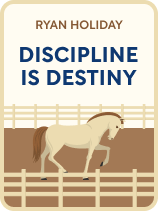

This article is an excerpt from the Shortform book guide to "Discipline Is Destiny" by Ryan Holiday. Shortform has the world's best summaries and analyses of books you should be reading.
Like this article? Sign up for a free trial here.
Does your life feel out of control? Do you take your life’s purpose into account when you schedule your day?
Practicing discipline helps you fulfill your one purpose by leading you to prioritize your purpose and behave appropriately. When you do this, Discipline Is Destiny says that your life will be well on its way to being the best it can be.
Continue reading to learn how to get your life in order, according to Ryan Holiday.
How to Get Your Life in Order
Holiday explains that, when you’re disciplined, you understand how to get your life in order by regularly refusing potential opportunities that would divert your attention from what matters most. Set clear limits regarding what you’re willing to do and with whom you’re willing to speak, and avoid people who try to cross those limits. But don’t try to do it all yourself: Willingly accept or pay for any help that buys you time to reflect on whether you’re doing what’s most important and to actually do that work.
(Shortform note: Holiday’s approach to prioritizing your purpose aligns with the essentialist philosophy that Greg McKeown discusses in Essentialism. Essentialists prioritize their purpose by refusing opportunities that divert their attention from it. Essentialists set clear limits and avoid people who try to cross them; if someone repeatedly distracts them, they plan how they’ll deflect her, such as by making a list of the types of requests from her that they’ll refuse. Essentialists also create space to escape and think, which helps them determine what their purpose is and explore how to fulfill it. And if they also follow the ideas in McKeown’s Effortless, they embrace anything that makes their lives easier instead of overexerting themselves.)
Prioritizing your purpose also requires that you design your schedule around your purpose. Wake up early so that you can focus on the most important work. Doing what matters first not only ensures that you’re not distracted by others’ demands (since they’ll still be asleep), but it also ensures that you actually do the thing you want to do instead of procrastinating—and potentially never getting around to doing it. Once you set this schedule, stick to it every day—even on the days when it’s difficult to do so. Most people struggle to remain consistent. So if you can master consistency, you’ll steadily improve—and ultimately, grow more than those who don’t do it every day.
(Shortform note: Other authors elaborate on why consistency is important. In How to Become a Straight-A Student, Cal Newport explains that being consistent turns doing this work into a habit. Once it becomes a habit, you’ll be less likely to procrastinate on it, and you’ll put in more hours, which means you’ll get better at it, as Malcolm Gladwell points out in Outliers.)
| Work When You Can Focus Waking up early, as Holiday suggests, may not help you focus on the most important work. Even if others are asleep when you awaken, distractions can come from other sources—for example, if you check your phone in the morning, you may be waylaid by messages and emails you received overnight. Moreover, you may struggle to focus in the early morning because, as When author Daniel Pink explains, we all have different biological clocks and so feel energetic at different times. Pink recommends doing your most important work when you feel most energetic—whatever that time may be. |
How to Work Well
Holiday adds that when you’re disciplined, you figure out how to do your work most effectively. Start by mastering the fundamentals. Many people want to tackle the harder stuff first, but not mastering the fundamentals leaves you vulnerable to bigger problems down the line. For example, if you don’t understand factoring (an algebra concept), you’ll struggle to complete calculus problems (which require factoring). So practice these fundamentals until you can do them in your sleep.
(Shortform note: Holiday highlights the necessity of mastering the fundamentals of what you want to learn. But in Ultralearning, Scott Young proposes an alternate first step: Before starting to learn something, figure out how you’re going to learn it. Try breaking your topic down into information (what you simply need to memorize), ideas (what you need to understand at a deeper level than facts), and processes (what you need to practice to understand), and list everything relevant to learn in each category. Then, use this information to identify critical areas of focus for your learning.)
As your skills progress, refocus your attention on improving incrementally: You should always see some improvement from the day before. As long as you prioritize improvement, you’ll retain the discipline to continue working—whether you’re performing well or poorly. Don’t get caught up in the idea that you have to do something perfectly, which can prevent you from working at all out of fear that you’ll never achieve perfection. It’s most important that you finish your projects.
(Shortform note: In The Bullet Journal Method, Ryder Carroll also recommends focusing on continual improvement and warns that chasing perfection can lead you to sabotage your potential because you can’t meet your impossibly high standards. To fight this mindset, track your progress in a journal; regularly note what you’ve accomplished and learned, decide how you can improve going forward, then record new goals and tasks based on your reflection.)
Figuring out how to do the work also involves knowing how to behave at each work session. Holiday emphasizes the importance of intense focus: When you’re working, pay attention exclusively to what you’re doing without allowing yourself to get distracted. Always put your best foot forward. As long as you do, you won’t become overly complacent if you do well (because you’ll keep putting your best forward despite external praise) nor devastated by unfavorable outcomes (because you know you gave it your all).
| What Other Experts Say About Practicing Well Intense focus and always putting your best foot forward are both features of deliberate practice, which Peak author Anders Ericsson agrees are essential to building your skills. But deliberate practice also includes other features; for example, it involves objective ways to evaluate your performance, and it’s usually done under the tutelage of coaches. That said, always putting your best foot forward may not be enough to keep you practicing. In Mindset, Carol Dweck explains that if you have a fixed mindset—and thus believe that your talent is innate—you likely won’t push yourself when you succeed (because you feel superior) and you’ll be discouraged by defeat (because you see it as a sign you’re not good enough). To keep working no matter what, you need a growth mindset—a belief that people can change and improve the abilities they’re born with. |
Additionally, push yourself to take action and work hard, even when you don’t feel like it, but also learn to recognize when waiting to act is the better option. For example, if you want a promotion at your job, work hard even when you’re not in the mood to do so. But if your company then goes through layoffs, wait to ask for a promotion until your company’s financial situation has improved.
(Shortform note: In 168 Hours, Laura Vanderkam agrees that timing is everything when deciding how to act. However, rather than focusing on when you should wait to act, she highlights the necessity of being as prepared as possible so that you’re able to take advantage of any opportunities that do arise. To do so, Vanderkam recommends working for 30 focused hours each week on your purpose and regularly trying new things so you can encounter potential opportunities.)

———End of Preview———
Like what you just read? Read the rest of the world's best book summary and analysis of Ryan Holiday's "Discipline Is Destiny" at Shortform.
Here's what you'll find in our full Discipline Is Destiny summary:
- Why your ability to practice discipline determines how successful you are
- How to practice discipline throughout various stages of your life
- Why the greatest enemy to discipline is your ego






